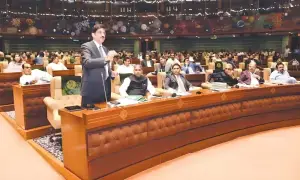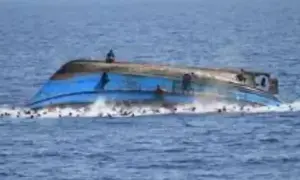Pakistan will seek exemption from US sanctions on gas pipeline with Iran
3 min readPakistan would seek exemption from the United States sanctions on the gas pipeline with Iran, the petroleum minister said on Monday as the country plans to meet its natural gas needs and avert a penalty for failing to complete the project on time.
“We cannot afford US sanctions,” Musadik Malik said in an informal conversation with reporters in Islamabad. “We have time after time told Iran that we need your gas and want to complete this project without any sanctions.”
The former caretaker government gave the nod to begin building an 80-kilometre segment of the Iran-Pakistan gas pipeline to ward off $18 billion potential penalties from Tehran.
It will extend from the Iranian border to Gwadar, at an estimated cost of $158 million (Rs44.2 billion). The project will be executed by Inter-State Gas Systems (Pvt) Ltd, an entity of the petroleum division, and will be funded through the Gas Infrastructure Development Cess.
Iran has already fulfilled its part of the deal by completing the construction of its seventh cross-country gas pipeline, starting from Asalouyeh and stretching 1,172km to Iranshahr. From there, it extends another 270km to the border of Pakistan, according to the available online details.
The Iran-Pakistan gas pipeline was also discussed when US Assistant Secretary of State Donald Lu appeared in the Congressional hearing on ‘Pakistan after the elections: Examining the future of democracy in Pakistan and the US-Pakistan relationship’ last week.
When asked, he said that the US was tracking the development following the announcement of the caretaker government to establish its side of the pipeline for gas from Iran.
“I don’t see from where the financing will come. We have not heard from Pakistan about the waiver of any sanctions. We want to have questions with Pakistan about where they can find other non-Iranian gas. Pakistan is interested in clean energy.”
But he also added that the administration was in contact with the government about the project.
Gas tariff
While speaking about the increase in gas tariff, he said that the government has concerns and added that a request for the spike in rates was sought from companies whether the dollar price was increased or not.
He revealed that gas was available to only 25% to 27% of the citizens, adding that 70% of the people don’t have access to the facility.
According to Malik, the shortage of gas was the issue of a small population as compared to the high cost of electricity with which 99 per cent of people are connected.
The petroleum minister explained that the rate of per unit electricity becomes Rs22 to Rs26 after running LNG plants on gas while the rate falls to Rs10 to Rs12 when made with local gas. The per unit cost of electricity would be Rs5 to Rs6 when plants are run on the wellhead price. “We have to provide cheap electricity to save gas.”
He went on to add that gas was being imported from Russia through the private sector. Malik added that he was not aware of the statements related to imposing sales tax on petroleum products.
For the latest news, follow us on Twitter @Aaj_Urdu. We are also on Facebook, Instagram and YouTube.





















Comments are closed on this story.